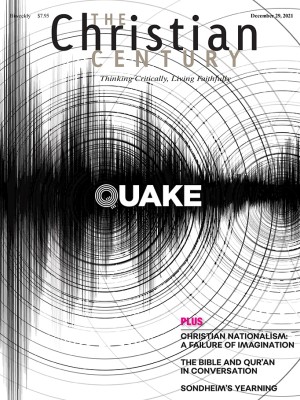
In recent months we’ve watched Jeff Bezos and Elon Musk launch themselves, people they choose, or whoever buys a $25 million ticket into space for 30 seconds of weightless bliss. Meanwhile, Facebook announced the possibility of a virtual world where we could find connection by simply slipping on a pair of goggles.
These extravagant attempts to leave the surface of our world could be seen as examples of billionaire excess. Except that many of us of more modest means often embrace other forms of escape—a trip to Hawaii, a Netflix binge, a lake house, a ski trip, a long bike ride—anything to escape our regular reminders that we are not in control. This impulse has been even more pronounced in this time when COVID has grabbed hold of every part of our lives.
Read our latest issue or browse back issues.
But escape has different meanings depending on where our feet rest. I remember when I was seven or eight, living in a little house with my mother and brother. After weeks of government cheese and mail that made my mom cry, one morning she woke us up and said, “We’re going to see your aunt in Florida.” After 12 hours of Michael Jackson and Led Zeppelin and McDonald’s stops, my brother and I found ourselves running to a beach, where we played and played and played in the sand and the sea.
My mother sat under an umbrella watching us, with a look that I would only understand when I became a parent. It was a look that took in even the smallest glimmer of sun because the clouds had been there for so, so long and the warmth was only momentary. It was a look that said she knew she would have to go back to the cheese and the mail and the uncertainty, but not yet.
It was a look I understood 20 years later after my mom shared the news that it was cancer, months not years. I got off the phone and could only watch my baby and my toddler play to keep the grief from pouring out. Some of us escape so we can survive another day.
I suppose that’s the question: Are we escaping for a moment so we can keep living with others? Or are we escaping to keep others from living with us? Sometimes we escape to imagine a life without weight, inconvenience, or reminders of need. There is a profound temptation to build a rocket—instead of building affordable housing or paying teachers a salary that reflects our children’s value.
Escapes to space and virtual utopias will always be about physics, engineering, math—if you get the math right and have enough money to invest, there’s no reason the goal can’t be achieved. The problems on the ground, of human personalities and histories that cannot be wiped clean, are the real mysteries. There are no equations for joy or trauma or wonder or grief, for the alchemy of mental, spiritual, and bodily life that entangles us or propels us into flourishing. We are complicated animals that often don’t make a lot of sense. And we create communities where the problems are rarely resolved even with the help of the cleverest inventions.
In my hometown of Seattle, in the shadow of Facebook and Amazon, we have watched tents, RVs, and villages of unhoused people pop up all around the city as rents rise. In our recent local election, faced with a choice between more police to sweep these encampments and more social services, our city chose police. Maybe we, too, wanted to escape some of these reminders of the complexity of people’s lives, or at least we didn’t want them in front of our storefronts and pressing into our parks. Maybe that’s the escape Blue Origin, SpaceX, and Meta reflect most deeply: escape from a world where the conditions always change, where the bodies are always in need.
In the midst of this allure of escape, I am reminded again of the sheer wonder of Christmas. In the face of all our many ways of saying no to a life with God, God chooses to say yes to us again. Instead of promising us escape from the mystery and contingency of this world, God chooses to come near. God becomes flesh that lives under the tyranny of empire. The Word enters, uncertain of a home, and becomes the child of an unholy family arrangement. This salvific movement is not the resolution of our problems but an abiding in the dirt and murkiness of our communal lives.
In abiding with us God also asks us to see the freedom that is possible in the midst of uneasy family relations, inadequate social policies, or even our own inner lives which can feel so treacherous and terrifying. The early teachers of the church taught us that God becomes like us so that we can become like God. But now God is like us, so to become like God is also to come nearer to ourselves—to each other—so that we might find the freedom of living in these bodies and all their complicated realities.
Maybe instead of escaping to live without the problems of this world, we might see where we can become present to this life, in all of its joy and its pain. And if we stay long enough, perhaps we can see what it is that God chose to love so deeply that she sought to be with us, to never escape from us.
A version of this article appears in the print edition under the title “The allure of escape.”






